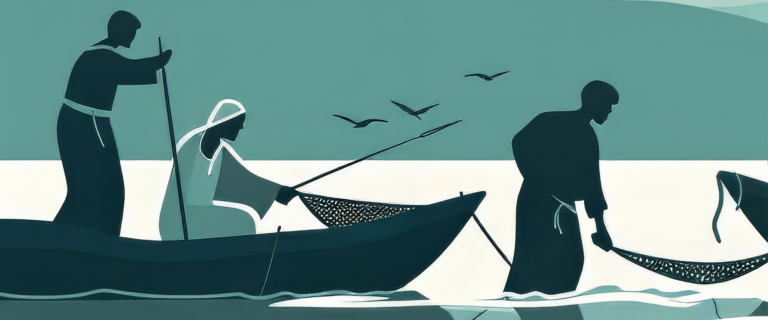The tomb is empty. Jesus has risen triumphant. Death and Satan are forever defeated. So now what? The Lord does not leave His people without purpose. He gives us a clear call, and we can know Jesus’ desire for us, His directions to us, through His encounters with the disciples following His resurrection.
If John’s Gospel had ended with chapter 20, we would have been left with a lot of questions, like: What kind of relationship did Jesus have with His disciples after the resurrection? What happened to Peter, who denied Jesus three times? Why don’t we have a full record of Jesus’ life? Thankfully, John 21 completes the story. We also see the mercy Jesus extends to His friends, though all had deserted Him (see Matthew 26:56). He does not abandon them but calls them to three significant tasks—calls that apply to all believers today.
- Jesus Says, “Listen to Me” (John 21:1-14)
In this passage, the disciples are out on the water fishing. Jesus has appeared to them after His resurrection and told them He is sending them (see John 20:21), but they are also waiting to be “clothed with power from on high” for the task of spreading the Gospel as Jesus instructed (Luke 24:49). So what do they do while they wait? They go fishing. We may wonder, “Have they given up on the call to be fishers of men and resorted to being fishers of fish?” We can’t be sure, but what is remarkable is that this scene harkens back to how Jesus first called them (see Luke 5:1-11; Matthew 4:18-22; Mark 1:16-20).
Peter, James, John, and Andrew were among those first called by Jesus. Each had willingly left all they knew behind—their boats, equipment, and families—to follow Christ. Then for three years they witnessed miracles, the transformation of lives, and also hostility toward and rejection of Jesus’ authority. They experienced monumental highs and catastrophic lows. And now they are back in their boats—essentially where they would have been if Jesus had never called them. Peter’s head must be spinning; maybe he’s decided to go back to what he’s good at. Yet, not only has he failed to be faithful to his Lord, he has failed to catch anything. Then, Jesus appears and reminds Peter and the other disciples of their calling: They will no longer be fishermen but fishers of men.
When Christ called them the first time, His call wasn’t temporary—it was for a lifetime. But the disciples needed to listen to the call to hear it. They needed to hear and heed the words of Jesus. When they obeyed His direction, they found there was a supply of fish they didn’t know was there—a supply so great it began to break the nets (see Luke 5:4-6). The fish were provided by the Lord, but the work needed to be done by the fishermen—just as Christ works in hearts but delights to have His disciples haul in the load.
When Jesus returns to His disciples on the shore after His resurrection, He again calls them to let down their nets (see John 21:6). But the nets were not torn despite the miraculous catch (see v. 11). You see, no matter the multitudes of nations that will be brought in, the Gospel nets will never break. What a comfort to know that when you feel inadequate to share the Gospel with someone, it’s not your work. It’s the Lord’s—and the Gospel nets won’t break. You can trust God. But you have to listen for His voice, for His direction, to be effective for His Kingdom.
- Jesus Says, “Follow Me” (John 21:15-19)
We need to remember in this account that Peter had failed Jesus. He had denied Him and wrongfully rebuked Him, but Jesus keeps coming back to Peter, molding and using him. Three separate times Jesus asks him, “Do you love Me?” recalling the three times that Peter had denied Him during His trial. Jesus is reinstating Peter, commanding him to serve His people. Then Jesus reveals to Peter the trajectory of his life. Peter will glorify God in his death through persecution and martyrdom: “. . . when you are old you will stretch out your hands,” an ancient world allusion to crucifixion (v. 18). Jesus concludes with the simple command: “Follow me!” (v. 19).
Surely, Jesus’ words stirred Peter’s memory of that first call to follow the Messiah. But they also must have challenged Peter to remain faithful even in the face of martyrdom. “Follow Me!” was an invitation for Peter to pursue Christ as his all in all. It’s an invitation for every one of us, for all who have sinned and fallen short of the glory of God. Though we may feel unusable or inadequate for ministry, Jesus invites us to pursue Him, our rock and fortress, our Deliverer, our delight, our true life.
To all you who are weary and burdened, who believe you have failed Him too many times, Jesus is saying, “Come to Me. Follow Me.” Don’t give up on Jesus because you think He has left you. He hasn’t. He never will. He is always faithful, so follow Him. His invitation stands.
- Jesus Says, “Focus on Me” (John 21:20-23)
In this last picture of Jesus with the disciples in John 21, Jesus and Peter are walking along the beach. Remember that Peter has just learned how he will die. You might expect him to be asking questions like, “Lord, when and how will this happen?” Instead, he immediately tries to compare his lot with another, asking, “Lord, what about him?” (v. 21). It’s human nature in full swing. Will my friends suffer the same fate? Will they be better off? For Peter, the cost of discipleship is high; he’s going to be martyred for the Kingdom. But what about John?
Jesus redirects him perfectly. “If I want him to remain alive until I return, what is that to you? You must follow me” (v. 22). It’s the same lesson for each of us: You listen to Me. You follow Me. You focus on Me. If we focus on how our life circumstances compare to others, then whom are we serving? We are focused on ourselves and not on God’s will. We aren’t trusting God’s plan and His promises of glory that far outweigh any of this world’s light and momentary afflictions. Rather, we’re prioritizing temporary concerns over eternal matters. If you are constantly obsessed with your neighbor’s circumstances—what he has that you don’t—what will you accomplish? You cannot be consumed with “fairness” and accomplish anything for the Kingdom of God. We must fix our eyes on Christ, remembering that by His grace and mercy we receive both the good that we do not deserve and escape the wrath that we so justly deserve. Jesus, indeed, is our shield and our very great reward (see Genesis 15:1).
This is the Good News of the Gospel: Jesus has freed our captive souls. The one who came to earth as a man, died a sinner’s death, was raised to new life, and transforms us by His Spirit—He is the one we cling to. He is the one we listen to. He is the one we follow. Are your eyes fixed upon Him?
Do you have questions about the Christian faith? We want to walk alongside you as you grow in your faith!
Share
Recent MY Journal

The Christian View of AI: From Davos and Harari to Faithful Ministry
February 10, 2026

Unmasking Inclusivism: Six Principles Threatening the Church
February 6, 2026
Sign Up for Ministry Updates
You might also like
Life of Jesus Christ
Having the Mindset of Christ Jesus
June 5, 2023
Cross and Resurrection
7 Evidences for the Resurrection
April 1, 2023




